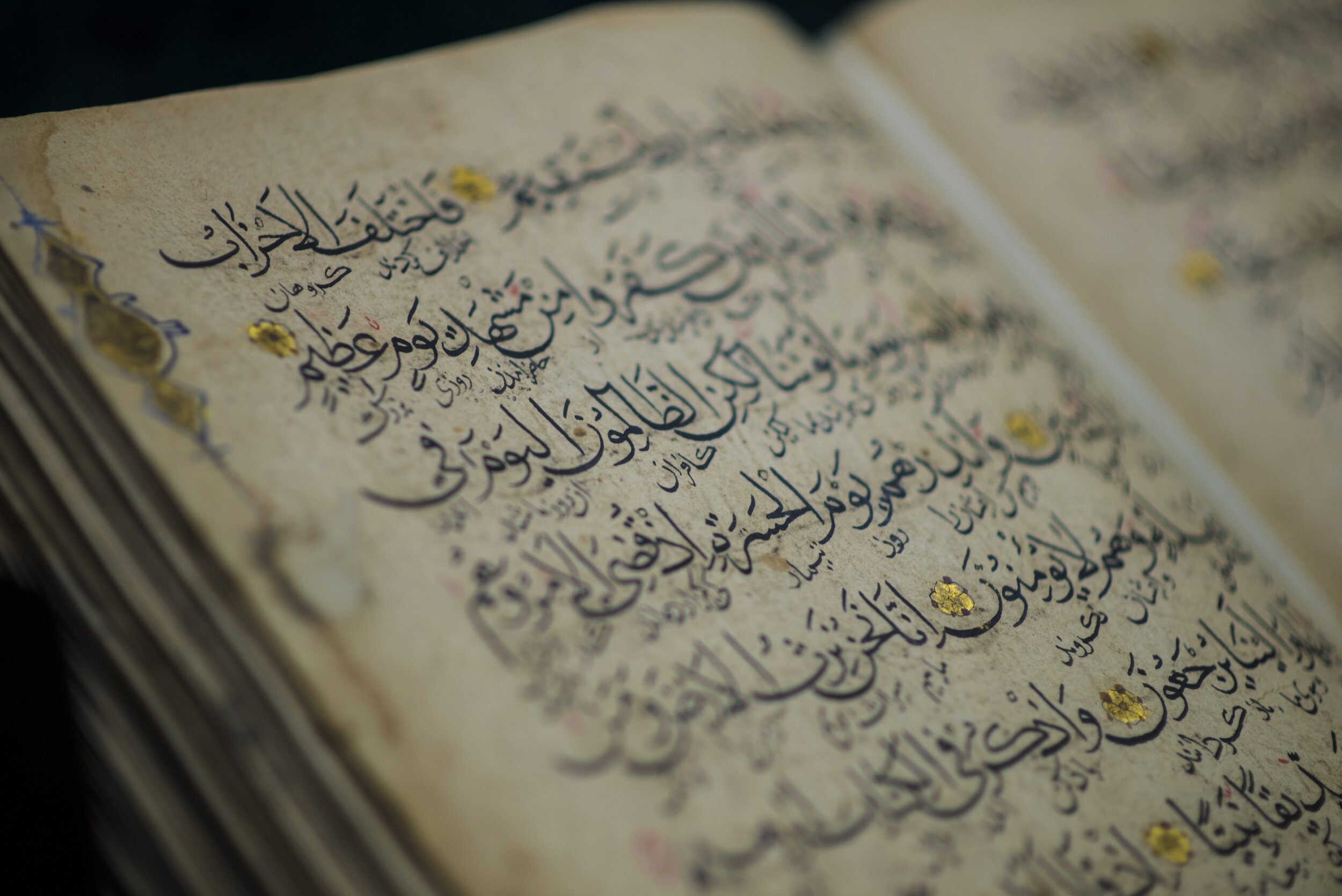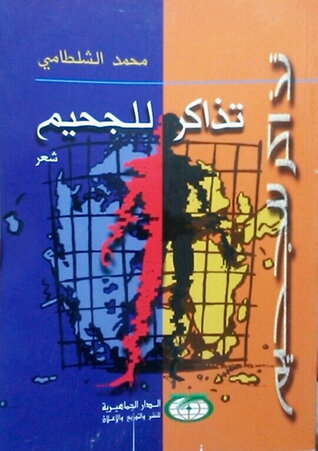LIBYAN LITERATURE & POETRY.
Libya’s literary tradition goes back to the period of antiquity, although it is difficult to find mention of Libya in the wider Arab literature renaissance of the 19th and early 20th centuries, possibly given Libya’s geographical distance from the levant and Arabian peninsula. However, it is argued that Libya’s own internal literary tradition developed during the same period. In particular, Libya’s experience with colonialism influenced Libyan literary tradition to a great extent, with major shifts in literature taking place after independence from its colonisers1.

Muhammad ibn Khalil ibn Ghalboun
Muhammad bin Khalil bin Ahmed bin Abdul Rahman bin Ghalboun, more commonly known as 'Ibn Ghalboun', was a famed Libyan historian and scholar, hailing from the city of Misurata in the late seventeenth century, during the Karamanli dynasty. As part of his formal education, Ibn Ghalboun left first for Tripoli, where he studied under the tutelage of Sheikh Abi Muhammad Abdullah bin Yahya Al-Susi Al-Hayhi, and eventually travelled to Egypt and where he studied at Al-Azhar Mosque under Sheikh Abdul Raouf Al-Bashbaishi. Ibn Ghalboun eventually returned to Misurata in 1720 AD. His historical text 'Al-Tadhkar fi man malaka Tarabulus wa-ma kana bi-ha min akhbar’, otherwise known as 'The Souvenirs of the King of Tripoli') is widley considered the most significant historical source on Libyan history of the period and, in many cases, is the only source of knowledge regarding numerous periods of Libyan history which would 0therwise have been obscured to posterity. During the Karamanli period an important history text titled (One who holds power in Tripoli) was produced by the court historian Muhammad ibn Khalil ibn Ghalboun2.
Ibn Ghalboun Mosque, Misrata names after famed court historian, Ibn Khalil ibn Ghalboun
LITERATURE OF THE 19TH AND EARLY 20TH CENTURIES
Libyan literature of this period mostly consists of journals specially dedicated to publishing material concerned with the political environment of that time. Notable Libyan journals of this period include Al Tarajim (The Translations) and Al Asr Al Jadid (The New Age). In these journals, both internal and external issues for the defense against European imperialism were debated3. During the years of Italian colonialism, more literature, mostly in the form of short stories and poems was produced, such as the poetry of Sulaiman al-Barouni, who was an important figure in the Libyan resistance to the Italian occupation. He wrote the first book of Libyan poetry as well as publishing a newspaper called The Muslim Lion. This was a period of resistance literature and as Wahbi al Bouri a former Libyan minister and accomplished short story writer, states in the introduction of Al Bawakir (The Vanguard), 'The Libyan short story was born in reaction to the Italian colonialism and its attack on Libyan culture'. However, this was a period of severe repression and copies of poems such as ‘Benghazi The Eternal’ were being secretly circulated by the resistance in order to fuel an uprising4.
Cover of ‘Memories of My Life’ by Wahbi Al Bouri
Dr. Ahmad Al Fagih, yet another influential writer of Libya and author of the lengthiest Arabic novel, ‘Maps of the Soul’, and the highly praised ‘Gardens of the Night’ trilogy, argues differently from Al Bouri and says that the period between 1908 and 1911 was the golden age of Libyan intellectual and cultural development, but with the arrival of Italians, this halcyon period vanished because the Italians actively suppressed Libyan culture and tried to impose their own - a key feature of colonialism. For Al Fagih, the period between World War II and Libyan independence stands out as a period of literary recovery5.
Dr Ahmad Ebrahim Al Fagih
Photo by Gheblawi, CC BY-SA 4.0 https://creativecommons.org/licenses/by-sa/4.0 via Wikimedia Commons
Born in Mizda in 1942, Ahmed Fagih is a highly regarded writer of Libya. He studied in Libya, Egypt and Scotland and received his doctorate in literature from the University of Edinburgh in 1982. He remained director of the institute of music and drama in Tripoli. ‘Gardens of the Night’ is regarded as the most well known work by Ahmed Fagih12.
Cover of ‘Gardens of the Night’ Trilogy by Dr Al Fagih
LITERATURE OF THE sixties
Following independence, and the withdrawal of many European countries which were present, the literature which emerged from the post war period not only represented the poverty that the country was going through, but also captured the hope that the people of the newly independent country were experiencing6.
During this period Libyan short stories gained traction to a greater extent. The discovery of oil in Libya led to a new era in the country. With the discovery of oil and the arrival of international companies in Libya, people experienced a major shift in their lives that is manifested in the literature produced during this period. The entry of oil companies and the potential for immense economic growth brought a ray of hope, but also concern regarding Western interference. The period also saw political discussions arising from the Arab nationalist movement and the Six Day War against Israel. These sentiments are translated into the creation of short stories, prose and poems written in this period7.
Famous writers of this period include Sadeq Al Neihum, Khalifa Al Fakhri, Kamel Maghur, Muhammad Al Shaltami, and Ali Al Regeie.
Sadeq Al Neihum.
Fatihi Alarabi. Creative C0mmons License, via Wikimedia Commons
Cover of ‘Islam in captivity, who stole the mosque and where did he go on Friday?’ by Sadeq Al Nehum
LITERATURE OF THE gaddafi period
Under Gaddafi, the literary situation of Libya became more restricted as his council implemented constraints on freedom of expression, persecuting writers who remotely opposed him. Many of the writers of this period found themselves imprisoned, tortured and their books destroyed: army personnel were known to raid bookstores and libraries and burn books in public squares. Founded in 1952, the biggest publishing house in Tripoli, ‘Dar Fergiani’ moved out of Libya and set up a new publishing house under the name Darf Publishers in London8.
Those who avoided the persecution and managed to live through this period always remained preoccupied with deep seated fear of arrest, such as Muhammad Al Shaltami, who was arrested and imprisoned three times, while others who found roles within the Gaddafi government found themselves isolated from their former literary colleagues who had gone into exile and faced persecution: the Libyan writers’ circle of the 1960s found itself politically fractured. Accordingly, the literature of this period is rich with symbolism and metaphors, which often took the place of overt expression9.
Cover of ‘Tadhakir li-l-jahim (Tickets to Hell)’ 1970. Collected Poetry of Muhammad Al Shaltami (1945-2010)
CONTEMPORARY LIBYAN WRITERS.
Ibrahim Al Koni (IBRAHIM KUNI)
Born in 1948, Ibrahim Al Koni is one of the most popular authors of Libya. He was born in Ghadames, Fezzan, hailing from the Tuareg peoples. Al Koni left Libya to study abroad, and lived in a number of countries including Russia, Poland and Switzerland, which he made his permanent home in the 1990s. Despite living a nomadic life, his writings are very well grounded in Libyan tradition, especially those of the Tuareg people. He received The Arab Novel award in 2010 and donated the value of the award for the welfare of children of Tuareg tribes10. His translated work include Seven Veils of Seth, and Gold Dust11.
Ibrahim Al Koni. alkoni,
Creative Commons Licenses 4.0 via Wikimedia Commons
KHALED MUTTAWA
Cover of ‘Zodiac of Echoes’ by Khaled Muttawa
Khaled Muttawa was born in 1964 and emigrated to the USA in 1979. Hailed as a very important writer who contributed to the introduction of Arabic literature to wider audiences through his efforts of translating them, Khaled Muttawa writes primarily in English, but Libyan and Arabic themes are dominant in his writings13.
Cover of ‘Amorisco’ by Khaled Muttawa
Hisham Matar
Hisham Matar was born in 1970 in New York and achieved prominence when his first novel 'In the Country of Men' was shortlisted for the Booker Prize. Matar’s childhood was shaped by Libya’s unstable political situation; travelling between Libya and the USA, his family faced political persecution under Gaddafi's regime, and were forced to escape to Egypt. Unfortunately, his father was kidnapped whilst in Egypt and his whereabouts remain uncertain, although it is thought he died during the 1996 massacre at Abu Salim. Both novels ‘In the Country of Men’ and ‘Anatomy of a Disappearance’, for which he won the Pulitzer Prize for Biography, deal with the fear felt by those living under the Gadaffi regime, as well as his own stress that came with his father’s absence and the knowledge that he would probably never know what really happened to him. Unlike the works of al-Koni and Fagih, Matar’s Libya is distinctively urban and strongly rebukes the political repression prevalent under Gaddafi14.
Cover of ‘The Return’ by Hisham Matar
Razan Naim al-Maghrabi
Al Maghrabi is a novelist and short story writer. Her ‘Women of the Wind’ is the story of female companionship and the secret lives of women, and was nominated for the International Prize for Arab Fiction. She has contributed articles to Libyan newspapers since 1991 and has been employed as a coordinator for the cultural magazine Horizons .Her work includes five collections of short stories, two novels and a collection of poetry15.
Cover of ‘Women of the Wind’ by Razan Naim Al-Maghrabi. Cover
LIBYAN poets.
Ahmad Rafiq al Mahdawi
Born in 1898, in Fissatu, Libya, Ahmad Rafiq Al Mahdawi was known as the ‘Poet of the Homeland’ with most of his poetry being political and reflecting his commitment to the cause of Libyans struggling against Italian colonialism. His epic poem Ghayth Al Saghir (Little Ghayth), is a very famous poem of its time and was secretly circulated in order to sustain the resistance against colonial rule. The poem, composed around 1937, told the story of a boy named Ghayth who wanted to take revenge on an Italian colonial official who had murdered his father. This was based on the real life story of a young boy imprisoned with his family in the Suluq concentration camp, where he lost both of his parents. His verses resonated with people struggling against Italian colonialism, that being so, the colonial administration which was on a mission to destroy everything that they found remotely opposite to their rule, forced Mahdawi to leave the country. He only returned to Benghazi in 1946 when British armies defeated colonial forces in Libya. His work Ghayth Al Saghir became an inspiration for the many poets and playwrights of the future who adapted his work into stage and screen plays. His work was received well by the Libyan people and the poems he wrote in local dialects were sung at weddings and other occasions. He died in 1961 in Athens, where he was seeking treatment for a medical condition16.
Ahmad Rafiq Al Mahdawi
Unknown author, Public domain, via Wikimedia Commons
Fatima Mahmoud
Fatima Mahmoud was born in Tripoli in the mid 20th century. She is a poet whose translated work ‘Here I Am Sleep’ appeared in volume 4 of Poems for the Millenium. She worked as a journalist in Libya from 1976 -198717. Mahmoud then moved to Cyprus where she founded a magazine called Modern Sheherzade. She returned to Libya but given the continuing hostility of the regime towards writers she was forced to seek asylum in Germany18.
Laila Neihoum
Born in 1961, Laila Neihoum is a poet, translator and editor. She was the first Libyan author to join the International Writers Program at the prestigious University of Iowa, USA. She has published short stories and poems. She primarily writes in Arabic but some of her famous poems have also been translated into English. Her translated works include The Melting Sun, Headquake and Butterflies of Meaning19.













